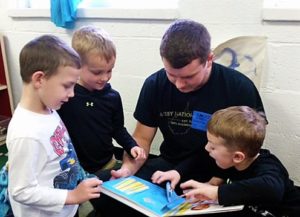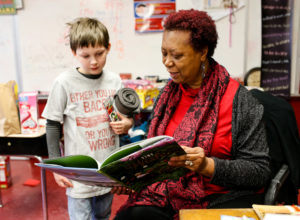By Mary Kay Bond, Lynn Kessler and Bethany Kinder
West Virginia workers are the least educated in the nation, according to a July 2017 article published by CNBC. When state leaders wrestle with the need to diversify and grow the state’s economy, this statistic must be considered and addressed. Improving the West Virginia economy involves developing an educated and healthy workforce, and increasing student reading levels is absolutely fundamental to achieving that goal.
Currently, 70 percent of West Virginia’s fourth graders are not proficient in reading, according to the National Assessment of Educational Progress. Research shows students who do not read on grade level are four times more likely to drop out of school than their peers and are far less likely to find employment. Additionally, students who drop out are more likely to need tax-funded social services since they are at a greater risk for becoming teen parents, abusing substances like drugs and alcohol, suffering from poor health outcomes and being incarcerated. The Alliance for Excellent Education research shows that each class of dropouts costs West Virginia more than $55 million in lifetime health care costs, and The Literacy Project Foundation has found that nationally, school dropouts cost the U.S. $240 billion a year in social service expenditures.

While these are daunting statistics, the solution is not complicated. It does, however, require the involvement of families, businesses and the community at large. Quality reading instruction is significant but not enough to change the educational climate of the state. Children benefit from instruction only when they are motivated to want to obtain the skill being taught. Too many of West Virginia’s children do not value reading enough to want to read.
In order to combat the outcomes related to low literacy, Read Aloud West Virginia, a 501(c)(3) nonprofit organization, puts books in the hands and on the minds of West Virginia children through four research-based programs: volunteer readers, book distribution, public education and classroom enrichment. The organization works to raise community awareness regarding the importance of reading to children from infancy into adolescence and the value of providing children with a print-rich environment.

Last year, Read Aloud distributed over 19,000 books and placed more than 1,000 volunteers in over 1,400 classrooms across West Virginia, including Berkeley, Boone, Cabell, Fayette, Grant, Greenbrier, Hampshire, Hardy, Jackson, Jefferson, Kanawha, Logan, Marion, Mason, Mercer, Mingo, Monongalia, Morgan, Nicholas, Ohio, Pocahontas, Preston, Putnam, Raleigh, Randolph, Summers, Tucker, Upshur and Wood counties. These volunteers, visiting classrooms on a regular basis throughout the school year, serve as live commercials for reading. The readers are also important role models who allow children to experience the joy of reading and, in so doing, motivate them to become proficient readers. Once equipped with this essential skill, students experience more success in all subject areas.
Despite West Virginia’s low literacy and economic statistics, there is reason for optimism. In 2015, the National Center for Education Statistics reported that West Virginia was the only state to show significant gains in eighth grade reading scores. Further, the reading gap between male and female students has shown a significant decline in recent years. Nevertheless, much work remains to be done. Moving the needle on education and diversifying West Virginia’s economy is contingent upon the engagement of all segments of society. When community volunteers, families, businesses and medical professionals become advocates for reading, West Virginia can begin building a culture that demonstrates it values reading. In doing so, the foundation is being set for building a stronger economy.
About the Authors
 Mary Kay Bond is the executive director of Read Aloud West Virginia.
Mary Kay Bond is the executive director of Read Aloud West Virginia.
 Bethany Kinder is the director of communications and development for Read Aloud West Virginia.
Bethany Kinder is the director of communications and development for Read Aloud West Virginia.
 Lynn Kessler is the technology manager for Read Aloud West Virginia.
Lynn Kessler is the technology manager for Read Aloud West Virginia.









One Response
Great article. Students need a purpose to learn something. A Read Aloud reader can serve this purpose. Thanks for all you do to grow readers in WV.